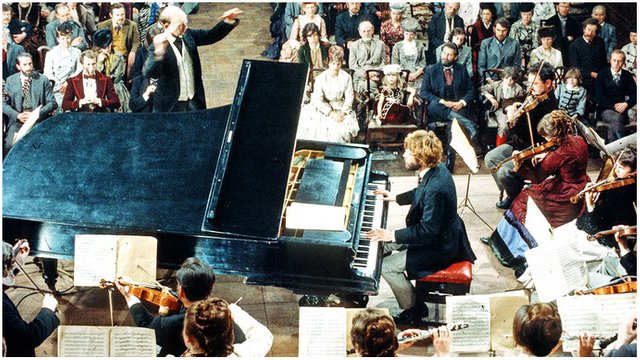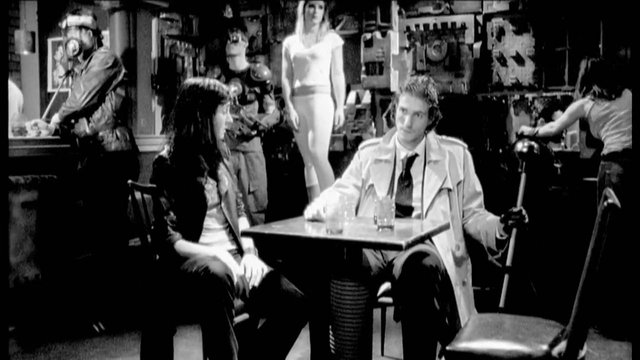MOVIE REVIEW: Medea, Music Lovers and Un Coeur en Hiver as regards Bakhtin’s “Hero and the Author”

The movie “Medea” made me to think about Bakhtin’s comments mostly regarding the creation of aesthetic value with respect to “outward actions” (Bakhtin, 1990, pp. 42-47). The main reason for me to think as such is that a big part of the movie is commited to the paganish deeds of two different societies, and they are such actions that there is very little dialogue and quite a bit wild environment. A significant point is that the actors do not have expressive mimics so much and it is at such a point that sometimes their movements might even be thought as mechanical. It is frequently the case that their inner thoughts and feelings can’t be read from their faces. If we read it from Bakhtin’s context, it is essential to remember that he says, “focusing on one’s own exterior in performing an action may even prove to be fatal, a force that destroys the action” (Bakhtin, 1990, p. 44). In other words, for the creation of the aesthetic value, he says that it is necessary to subside the outward actions to the field of inner senses. He poses this internality as a transgredient point to the field of those deeds and through this transgredient point which would create the artistic value because one is never able to experience the aesthetic value of his/her deeds only from within himself/herself.
In the film, the fact that we watch actions and deal with their outward appearances was at the very front stage. The actions were in a great number whereas the number of any clues as concerns the consciousness of the actors (or the hero) was at the minimum. Hence, for the purpose of creating the aesthetic value, since the movie does not guide the watchers in this internal field, we had such a large field for interpretations and imagination that sometimes I felt totally lost about what to feel and how to evaluate those deeds. And since the whole responsibility for the creation of the aesthetic value is on the shoulders of the watcher as “the other”, when the movie leaves the watcher so guideless, one is likely to feel this feeling of being lost. Of course, there are cases (especially at the beggining of the movie where the watcher is loaded with a fast stream of religious or philosophical ideas which were very hard to catch up) where the expressions of the feelings of hero casts a shadow on the focus on the outward appearance of her deeds, and they get more and more in number through the end of the movie, specifically after we learn who Medea is at the middle of the movie and what it is that she aims at. But such a difference within the movie was fruitful in terms of understanding what he means when Bakhtin says the outward characterizations are transposed to a different plane, to the horizon of the watcher and the aesthetic value could only be created by this. Being at the extreme of having the whole responsibility for creating this inner field, the horizon with a very little clue, was followed by being at the extreme of being guided by the unbearable screams of the actors at the scenes of death and creating the necessary field of horizon accordingly; and this was quite interesting and thought-provoking in terms of Bakhtin’s comments.

The movie “The Music Lovers” made me think about reacting to the whole of the hero for the creation of the aesthetic value. It is a long movie with a lot of ups and downs in it; and this makes the watcher contemplate about the happenings event by event, which is indeed not very fruitful for evaluating the aesthetic character of the hero well enough. The movie starts with beautiful and heaven-like dreams of different people, which are provoked by one and the same song as a unifying element. Until the end of the movie, one may engage in the aesthetic evaluation of the hero of the film, which is surely to be changed after the hero’s scene of confession at the edge of death; and this fact made me think about what Bakhtin means by the whole of the hero. I thought he means more than one thing by this. First, Bakhtin criticizes making fragments from the artwork and evaluating the artwork according to those fragments, because the parts never represent the whole of the artwork (Bakhtin, 1990, p. 9). When we look at “The Music Lovers”, we see that without the end of the film, the movie is totally something else and Bakhtin is right in saying that the parts, which are what I call events in the movie, does not represent the whole. “The Music Lovers” proves to be a good example for understanding Bakhtin’s comments about this.
The second thing Bakhtin means by “whole” does not have anything to do with the relation between the whole and its parts. It only has to do with the possibility of consummation by the creation of an external point to it. As far as I understood, we can talk about the whole as long as we are able to specify an “other” to it. By the excess in the seeing of the other, the artwork turns into a whole with an aesthetic value. In “The Music Lovers”, I noticed that how I transpose the axiological plane of the movie to my own horizon was largely guided by Tchaikovsky’s music. Thus, I came to realize that music has such a character that it is very easy for it to get inside the listener, but it is very difficult for it to carry a single or similar message intended by its creator. It is indeed not like how it is represented in the film where, through Tchaikovsky’s music, people have similar dreams where they dance with their partners and have a great time in a heaven-like place. Just the reverse, there takes place such a multitude that it is very hard to trace back to a similar feeling. Hence, I am not sure, through engaging in this movie, whether the aesthetic value I created belongs to the whole of the movie in total, or to the artwork of Tchaikovsky in the real life. In other words, the wholes of two different artworks, the movie and the music of Tchaikovsky were interwoven, and I am not sure about where my transgredient point as the source of the artistic value stands with respect to those artworks.

In “Un Coeur en Hiver”, especially the character “Stephane” was interesting. It was totally open to be delimited from outside and I believe it is a clear example for grasping Bakhtin’s comments, since this character gives the necessary space for the creation of the artistic whole. It was very clear that such a hero can in no way be characterized as an “absolute consciousness which has no transcendent points to it”. It is such a personality that the watcher gets sure that the creator does not entirely take the possession of it, which is the first form for Bakhtin where consummation turns sort of problematic.
This is very interesting, I think I'm going to look into some of his writing. Recommends?
Great interpretation! I'd definitely recommend Art and Answerability for an overall view of Bakhtin's thoughts on art. I love it how what I've read from his texts sometimes pokes me in the middle of a movie and lets me delve deeper into what I watch. Despite the fact that there are a few points I do not agree with him, it's no doubt that he's a very inspirational figure.
The internal life of the artist interests me, as something to apply to literature, and reading and writing personally.
There is Transcendence through art, ssimply on the grounds of the translation of inner-life, inner-witness, self, to an external audience (whether with intent or via subconscious)
Lately I got a book which is a collection of Kafka's hand-drawings. Of course his literary skills and his drawings are of essentially different nature since they're different art styles, but I think it did expanded my horizon about Kafka's creative imagination. Knowing more about writers may lead us to a certain interpretation exclusively and it may pose a risk in terms of relating to the essential richness of the work, but as long as we discuss the pros and cons of knowing more about the writer and be aware of what's going on, I think it definitely expands vision and imagination.